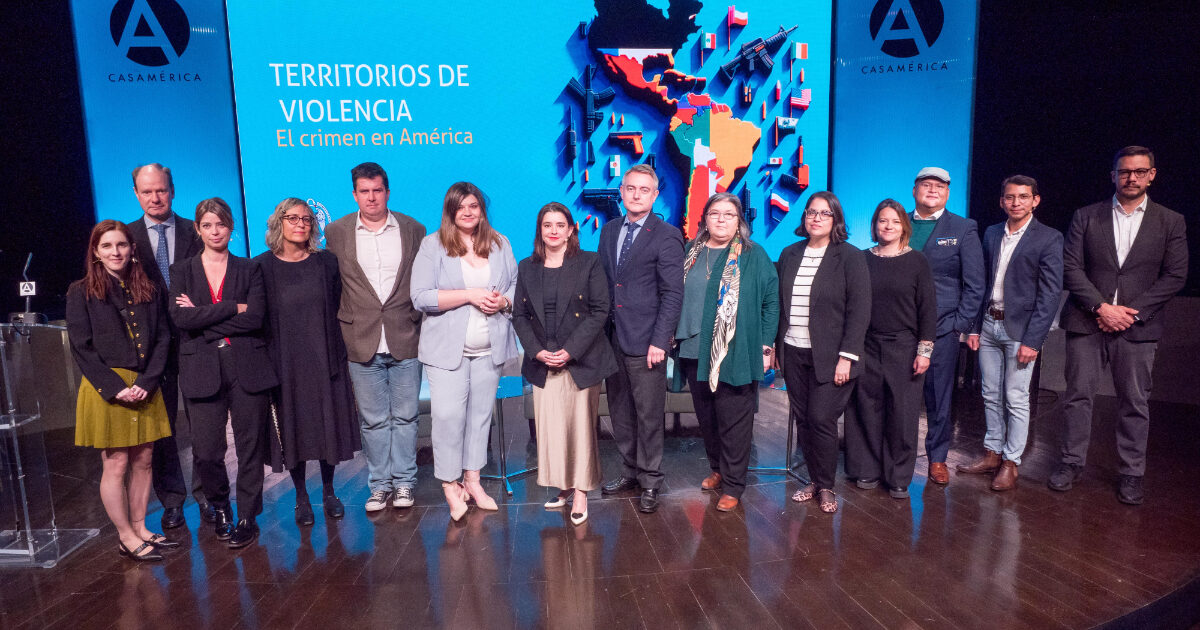Violence in America Latina it’s us Caribbean continues to be the protagonist. This is what emerged from an international meeting which was celebrated throughout the day April 23 a House of America in the heart of Madrid, entitled “Territory of violence. Crime in America.”
In an intense debate, with high-level testimonies and analyses, the various aspects that fuel this spiral in the Latin American region were discussed, using a broad perspective that encompasses geopolitics, migrations, feminicides and environmental protection. The starting point offers it InSight CrimeThat in its regional report referring to last year he explains that “in 2023 in Latin America and the Caribbean they were killed at least 117,492 people, with a homicide rate of 20 per 100,000 inhabitants. However, homicide data in many countries is non-existent or unreliable, so the real number is likely higher.” To be able to make a comparison we must think that in Europe we find Italy with a number of murders per 100 thousand inhabitants equal to 0.6, in Germany 0.9, the United Kingdom 1.2 and France 1.4.
Read also from Diego Battistessa’s blog
Latin America, institutional violence is a cycle that must be broken
Analyzes on the geopolitics of violence have shown that organized crime continues to grow in 22 of the 35 countries of the American continent (also including North America) because, as explained by Nicolas Zevallos Trigoso (criminologist and founder of the Institute of Criminology and Studies on Violence of Peru) “the criminal organizations they democratized violence and crime in many scenarios.” Specifically, the cases of Colombia were analyzed, where the president Gustavo Petro he is trying to implement a plan he himself calls “Total Peace”, and of Mexico, where in a few weeks we will go to the polls to elect the future president. In Colombia it was highlighted that today there are still at least 18,000 people linked to criminal armed groups in urban areas and 15,000 in rural areas, numbers huge which measure the challenge facing the first left-wing government in the 200-year history of the South American country.
In Mexico, a country under observation for feminicides (12 women are killed a day), the expansion of the cartels, especially that of Sinaloa and the Jalisco Nueva Generación cartel, has led the latter to diversify their range of action (centered at first mainly on the drug trafficking), also including human trafficking, vehicle theft, mining extortion, pharmaceutical piracy, arms trafficking, kidnapping, etc.
There was no shortage of reflections on the “Bukelization” of the region and what is happening in the Salvador, where President Bukele has kept the country in a state of exception for two years. In this sense, the result of the consultation of April 21st, requested by the Ecuadorian president, is worth mentioning Daniel Noboawhere the population decided to authorize the armed forces to expand their range of action to pacify a country that in 2023 alone reached the figure of 8 thousand homicides: a rate of 45 deaths by homicide per 100 thousand inhabitants (the highest in the region).
An important point of analysis concerned the migrations which increasingly represent a factor profit for criminal organizations. Migrations, it was reported during the event, occur in Latin America mainly due to three factors: the economic one, the problem of insecurity and environmental degradation (climate migration). The main destination continues to be the north, specifically the USA, with routes of death where women especially are exposed to the risk of rape and where the rate of kidnappings is growing, with the aim of demanding huge ransoms from the families of the victims for their release. As regards the environment, the NGO Global Witness also participated in the event, placing emphasis on the exploitation of natural resources and the criminalization of those who defend the territory: people who very often in the Latin American region they pay with their lives the price of their courage.
Read Also
Drugs, poverty and work: this is how Ecuador fell into the spiral of gang violence
As already reported, Mexico leads (sad record) in the ranking of feminicides; but in general, 14 of the 25 countries with the most cases of femicides in the world are located in Latin America. Here also theHonduras has a sad record: it is in fact the country with the highest number of femicides per population rate, according to the data offered by Cepal. In this sense, the well-known Afro-feminist intellectual, sociologist, writer and activist Esther Pineda G. underlined during the event how the origin of the problem in many of these countries is of an institutional nature, given that “the majority of states do not believe in violence against women. They simply give in to social pressure, but then they don’t create the conditions real and effective measures necessary to structurally combat the phenomenon” thus generating an inadequate institutional response.
What emerged from this day of reflection is also confirmed and expanded by what we read in the detailed Amnesty International report on the state of human rights in the world in 2023, made public the following day (April 24). In the document, compared to the regional analysis, it explains that civic space has continued to shrink throughout the Americas, jeopardizing the human rights gains achieved in previous decades. Journalists and human rights defenders, particularly those working for climate justice and those who have fought to protect their land and the environment, have been subjected to harassment and criminalization, assaults and murders. Most American countries lack robust systems to protect human rights defenders, and at the same time security forces respond forcefully illegitimate to peaceful demonstrations. Added to this is the fact that the authorities continued to violate the rights to life, liberty, due process and physical integrity, and cases of arbitrary detention were increasingly widespread.
In short, a regional situation worryingwith an increase in the protagonism of transactional criminal groups, of alliances between them and where impunity and corruption create fertile ground for violence.
